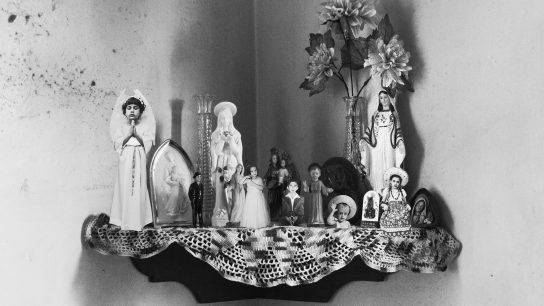Illusorium
by
Inauditas: Tracing the Sound of Migrant Memories in Venezuelan Women Photographers is an exhibition on migrant photography and photography of migration, focusing specifically on Venezuelan migration from 2016 to 2022. Each artist featured in this exhibition challenges the notion of photography that reduces it to the “visual,” while disorganizing a traditional notion of the “audible” that takes away its “auratic” effects, thus reinforcing the experience of photography as one of listening.
Illusorium includes both English and Spanish text translations.
Illusorium (English)
Reinterpreting family photographic archives involves coming and going from the real to the imaginary. Locating the limit between both, from photographic creation, is clearly a fruitless task.
Creating a photomontage is an act of emancipation, just like imagining. The imaginary abandons the real and moves towards its own space and time, articulating a kind of protected area. And it is from there, that in a burst of pure image, the breaks of the soul reappear transfigured.
The documentary value of the family album is incalculable. It is a support for identity, for roots and for the continuity of ties. However, this does not make it safe territory. Delving into the album involves the risk of running into the absence of some, and worse still, with the absence of oneself.
Placing these domestic and involuntarily artistic photographs in new settings is a gesture of will, denial and resistance. At the end of the process, the visual result openly flirts with the illusory, from where it is possible to circumvent the crossroads of emptiness and absences.
Already quite far from reality, these new hybrid images reclaim their territory, annulling in their wake the gray sensation, so current in our times, that every photograph has already been taken.
When I finish a photomontage, the scene that unfolds before my eyes does so in such a disconcerting and genuine way that at times it seems completely alien to me. Could this be the moment where the intimate becomes public?
– Wendy Estrella Yanarella
Curatorial Commentary
A delicate and almost tacit concatenation of kinship is woven from these images. The blood relationship with her grandparents Nicolino and Hortencia is simultaneously for Wendy Estrella the origin of her relationship with photography, and these links are reinforced as a statement about her own “purely vernacular” practice. It is the factual experience of relocation that the migrant condition introduces in this new stage of her life, which reveals to Estrella her own photographic object more clearly: her grandmother’s house, the family memory and the family album, which intervenes during the years in which he lived in Argentina.
Accepting the loss that migration brings with it took her a while, but it was precisely from there, from the absence of the house as a place of memory, that the unspeakable of her experience was given (and ceded?) to a new language. Thus, from a “resolute desire” she begins his technical experimentation with photomontage in which the keys of amateurism, sense of community or extended family and fictional(ized) experience materialize in an illusory key poetics, as the series title announces.
Illusorium (Español)
Reinterpretar los archivos fotográficos familiares supone un ir y venir de lo real a lo imaginario. Ubicar el límite entre ambos, desde la creación fotográfica, resulta una labor a todas luces infructuosa.
Crear un fotomontaje es un acto de emancipación, como lo es imaginar. Lo imaginario abandona lo real y se desplaza hacia su propio espacio y tiempo, articulando una especie de zona protegida. Y es desde allí, que en un estallido de pura imagen, los quiebres del alma reaparecen transfigurados.
El valor documental del álbum de familia es incalculable. Es un soporte para la identidad, para el arraigo y para la continuidad de los vínculos. Sin embargo, no es un territorio seguro. Adentrarse en el álbum implica el riesgo de toparse con la ausencia de algunos, y peor aún, con la propia ausencia.
Emplazar estas fotografías domésticas e involuntariamente artísticas en nuevos escenarios es un gesto de voluntad, de negación y de resistencia. Al culminar el proceso, el resultado visual coquetea abiertamente con lo ilusorio, desde donde es posible burlar las encrucijadas del vacío y de las ausencias.
Ya bastante alejadas de lo real, estas nuevas híbridas imágenes reclaman su territorio, anulando a su paso la gris sensación, tan vigente en nuestros tiempos, de que toda fotografía ya ha sido hecha.
Al concluir un fotomontaje, la escena que se revela ante mis ojos lo hace de un modo tan desconcertante y genuino que por momentos me resulta completamente ajena. ¿Será acaso este el instante donde lo íntimo se vuelve público?
– Wendy Estrella Yanarella
Comentario de las Curadoras
Una delicada y casi tácita concatenación de parentesco se teje desde estas imágenes. El lazo consanguíneo con los abuelos Nicolino y Hortencia es simultáneamente para Wendy Estrella el origen de su vínculo con lo fotográfico, y estos lazos se refuerzan como declaración sobre su propia práctica “netamente vernacular”. Es la experiencia fáctica de deslocalización que introduce la condición de migrante en esta nueva etapa de su vida, lo que le revela a Estrella con más claridad su propio objeto fotográfico: la casa de la abuela, la memoria familiar y el álbum de familia, que interviene durante los años en que vivió en Argentina.
Asumir la pérdida que trae consigo la migración le llevó un tiempo, pero fue precisamente desde allí, desde la ausencia de la casa como recinto de la memoria, que lo indecible de su experiencia se dio (¿y cedió?) a un nuevo lenguaje. Así, desde un “deseo decidido” comienza su experimentación técnica con el fotomontaje en el que las claves de amateurismo, sentido de comunidad o familia ampliada y experiencia ficcional(izada) se materializan en una poética en clave ilusoria, como anuncia el título de la serie.
This photo essay is part of the Inauditas: Tracing the Sound of Migrant Memories in Venezuelan Women Photographers series, funded by a UCHRI Engaging Humanities grant.











